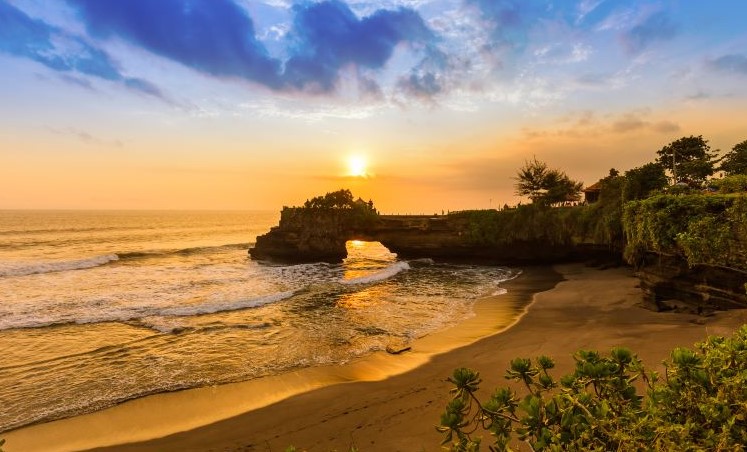The Best Time to Go to Bali: A Guide for Travelers. Are you planning a trip to Bali and wondering when the best time to go to Bali is? Bali is a beautiful island in Indonesia that offers a tropical paradise with stunning beaches, lush greenery, and a rich cultural heritage. The best time to go to Bali depends on your preferences and what you want to do during your trip. Here’s what you need to know!
Daftar Isi
Exploring The Best Time to go to Bali

Bali experiences a tropical monsoon climate, characterized by two distinct seasons: the dry season and the wet season. Understanding these weather patterns will help you plan your trip accordingly and maximize your time on the island and choose the best time to go to Bali.
Understanding Bali’s Weather Patterns
The dry season in Bali typically runs from April to September, while the wet season spans from October to March. The dry season is characterized by sunny days, low humidity, and minimal rainfall, making it the preferred time for many travelers. On the other hand, the wet season brings lush green landscapes, occasional downpours, and a more tranquil atmosphere.
The Dry Season: Perfect for Sun Lovers
During Bali’s dry season, the weather is generally sunny and rainfall is scarce. This period offers the perfect conditions for beach lovers, surfers, and outdoor enthusiasts. With temperatures ranging from 27 to 32 degrees Celsius (80 to 90 degrees Fahrenheit), the dry season provides an ideal climate for exploration and relaxation. It is worth noting that the dry season coincides with Bali’s peak tourist season, which we will discuss in more detail later.
Bali Rainy Season: Embrace the Tropical Rain
While the wet season in Bali is characterized by more frequent rainfall, it doesn’t necessarily mean your trip will be washed out. The rain showers are typically intense but short-lived, allowing you to continue your activities after a refreshing downpour. Additionally, the wet season offers a lush and vibrant landscape, with rice terraces and jungles thriving in the tropical rain. The wet season is also considered the off-peak period, providing a quieter and more tranquil experience for those seeking relaxation and serenity.
What are The Best Months or Peak Seasons to go to Bali?

Usually the best time to go to Bali or Bali’s peak tourist season falls within the dry season, particularly from July to August. During this time, the island sees an influx of visitors from around the world, creating a vibrant and energetic atmosphere. The peak season offers a range of advantages and opportunities, but it’s essential to consider the potential challenges as well.
Benefits of Visiting Bali During Peak Season
One of the main advantages of visiting Bali during the peak season is the abundance of events, festivals, and cultural celebrations taking place. From colorful processions during Galungan and Kuningan to lively dance performances and temple ceremonies, you’ll have the opportunity to immerse yourself in Bali’s rich culture. Additionally, the vibrant nightlife scene is at its peak, with beach clubs, bars, and restaurants buzzing with excitement.
Challenges of Visiting Bali During Peak Season
As with any popular tourist destination, Bali can become crowded during the peak season. Popular attractions, such as Tanah Lot and Ubud’s Monkey Forest, may be teeming with tourists, and accommodation prices tend to be higher. It’s advisable to book your accommodations well in advance and plan your itinerary carefully to avoid overcrowded spots.
Exploring Bali’s Shoulder Season
If you prefer to avoid the crowds of the peak season but still want to enjoy favorable weather conditions, Bali’s shoulder season is an excellent alternative. The shoulder seasons fall just before and after the peak season and offer a balance between desirable weather and a less crowded atmosphere.
Advantages of Visiting Bali During Shoulder Season
During the shoulder season, which usually encompasses April to June and September to October, Bali experiences fewer visitors compared to the peak season. This allows for a more relaxed and intimate experience, with shorter queues at popular attractions and more availability in accommodations. The weather remains pleasant, with lower humidity and occasional rainfall.
Considerations for Traveling During Shoulder Season
While the shoulder season offers many advantages, it’s important to note that weather conditions can be slightly more unpredictable during this time. There may be occasional rain showers, but they are generally shorter and less intense compared to the wet season. It’s advisable to pack a light rain jacket or umbrella to stay prepared for any sudden showers.
Choosing the Best Time to Go to Bali
When deciding on the best time to go to Bali, several factors come into play. It’s crucial to consider your weather preferences, budget constraints, and the activities and experiences you wish to pursue.
Weather Preferences
If you prefer dry and sunny weather for beach activities and outdoor adventures, the dry season is your best bet. On the other hand, if you enjoy the lush greenery and don’t mind occasional rain showers, the wet season can offer a unique and tranquil experience. The shoulder seasons provide a balance between the two, with fewer tourists and pleasant weather conditions.
Budget Considerations
Your budget may also influence your choice of travel season. If you’re looking for more affordable accommodation rates and flight fares, the off-peak season is ideal. However, if you’re willing to splurge and take advantage of Bali’s vibrant events and nightlife, the peak season may be worth the extra cost.
Personal Interests and Activities
Consider the activities and experiences you wish to partake in during your Bali trip. If you’re keen on attending cultural festivals, vibrant nightlife, and socializing with fellow travelers, the peak season offers a vibrant and energetic atmosphere. Alternatively, if you prefer a quieter and more intimate experience, with a focus on exploring nature and spirituality, the shoulder or off-peak season may be more suitable.
The best time to go to Bali depends on your preferences and what you want to do during your trip. If you want great weather conditions, visit during the dry season from April to October. If you want lower prices and quieter beaches, consider traveling during the rainy season from November to March. Whatever time of year you choose the best time to go to Bali, you’re sure to have an unforgettable experience!
To explore all that Bali has to offer comfortably and flexibly, you can consider the car rental service provided by Get&Ride Rent Car Bali. With their high-quality service and a wide range of vehicles to choose from, Get&Ride Rent Car Bali makes it convenient for travelers to navigate the island and discover its hidden gems.
FAQ
When is the peak tourist season in Bali?
Bali’s peak tourist season is generally from July to August, coinciding with the dry season. During this time, the island experiences an influx of visitors, vibrant cultural events, and a lively nightlife scene.
What is the weather like in Bali?
Bali has a tropical monsoon climate with two main seasons: the dry season and the wet season. The dry season typically runs from April to September and offers sunny days with minimal rainfall. The wet season spans from October to March and brings occasional rain showers and higher humidity. The shoulder seasons, which fall just before and after the peak season, offer a balance between the two.
Are there any advantages to visiting Bali during the shoulder season?
The number of tourists is significantly lower compared to the peak season, allowing for a more relaxed and intimate experience. Accommodation rates are often more affordable, and popular attractions are less crowded.









